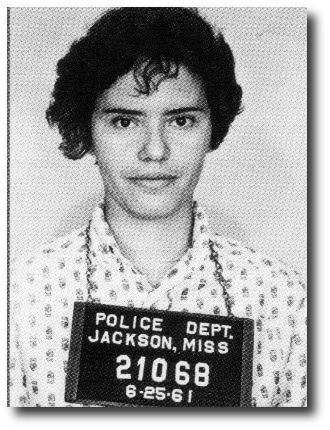When the U.S. Supreme Court issues a ruling, its decisions can carry weight for generations. For instance, civil rights decisions to overturn schools segregation or to uphold the Montgomery bus boycott are just as significant today. But another Alabama case from that era had a subtle effect on how courts treat defendants.
It used to be customary to only address black people by their first name.
That practice didn’t sit well with Mary Hamilton. She was a teacher, a Freedom Rider and the first female field organizer in the south for the Congress of Racial Equality. Sheila Michaels was her roommate during this time and said Hamilton was tough and brave — like the nuns of her Catholic school upbringing.
“Her opinions were unbendable, iron,” said Michaels.
Hamilton’s Day in Court
Civil rights protests in Alabama hit a crescendo in the spring of 1963. In Gadsden, police arrested Hamilton and other demonstrators. At a hearing that June, the court referred to her as “Mary.”
“She just would not answer the judge until he called her ‘Miss Hamilton.’ And he refused. So he found her in contempt of court,” Michaels said.
Hamilton was thrown in jail and fined $50. The NAACP took up the case. It eventually appealed to the U.S. Supreme Court which ruled the following year in Hamilton’s favor. In other words, everyone in court deserves titles of courtesy regardless of race or ethnicity.
Sheila Michaels says Hamilton was immensely proud of the case.
“I mean a Supreme Court case, you know, decided for you. Are you kidding, this is a big deal,” said Michaels.
It’s a big deal for a person, but a footnote in the history books. And when it comes to civil rights history it’s the names of men such as Martin Luther King Jr. or Ralph Abernathy that are mostly remembered. Women don’t get much billing beyond Rosa Parks.
Women in the Civil Rights Movement.
Historian Tara White researches women in the civil rights movement. She says part of the reason is during that time period women weren’t in prominent roles. Journalists compounded that by gravitating to male leaders. But White says without women there’s no movement.
“The majority of the folks who were doing the day to day work were women. The majority of the people who were participating in protest marches and those kinds of things were women,” White said.
White says Mary Hamilton wasn’t just bumping up against racial attitudes. Her behavior in court was not what the south expected of a lady.
“Lower class, loose women, call attention to themselves. Real ladies don’t do that,” said White.
Hamilton died in 2002, but the “Miss Mary Case” as it became known still holds important lessons today. Dain Stewart is a student at Samford University’s Cumberland School of Law. He said they’re taught to use mister or missus particularly when cross examining non-expert witnesses in front of juries.
“Cause they’re not just Jim or Steve or Mary just sitting there. Looking down upon them. But they look up on them as an equal or someone that they respect,” Stewart said.
Titles command respect. Especially for Miss Mary Hamilton.

